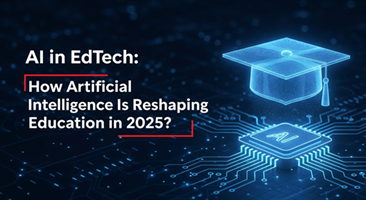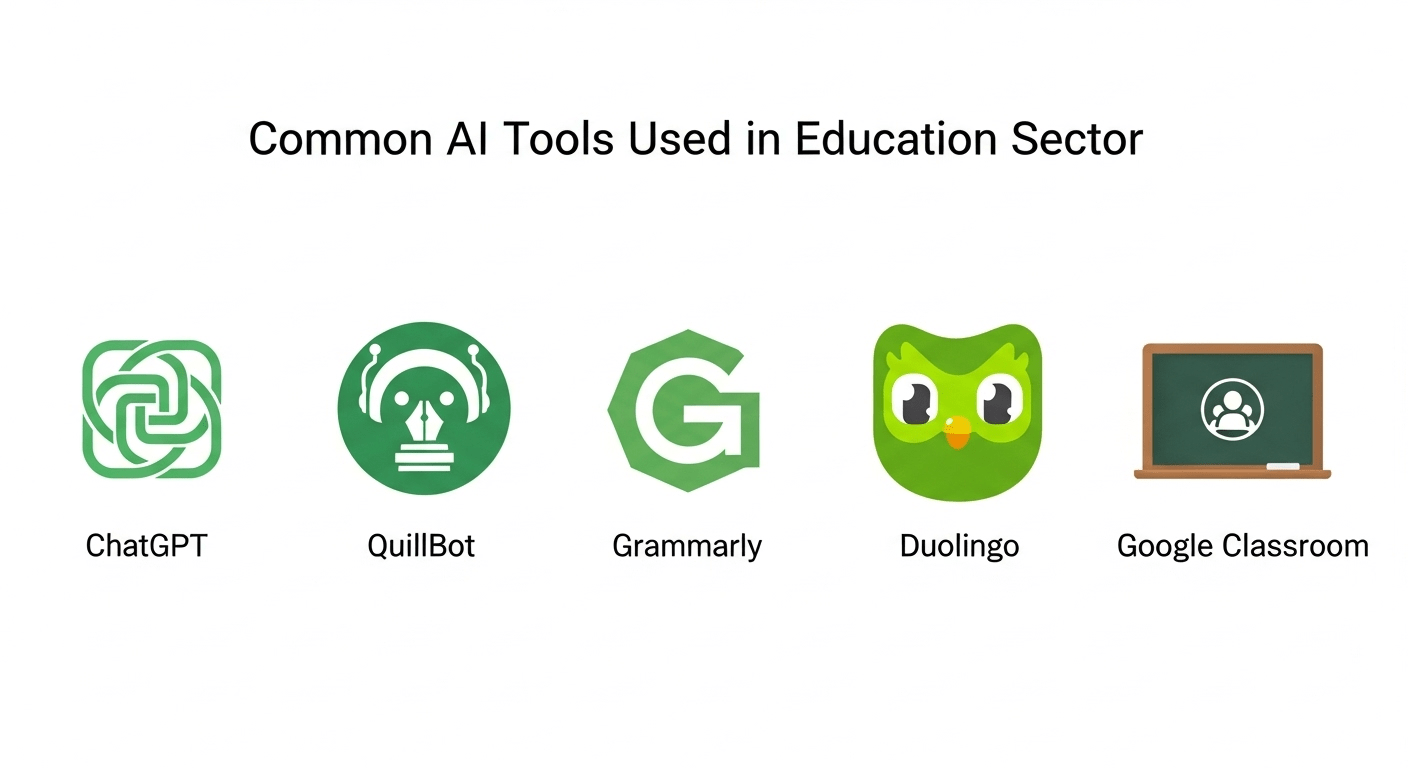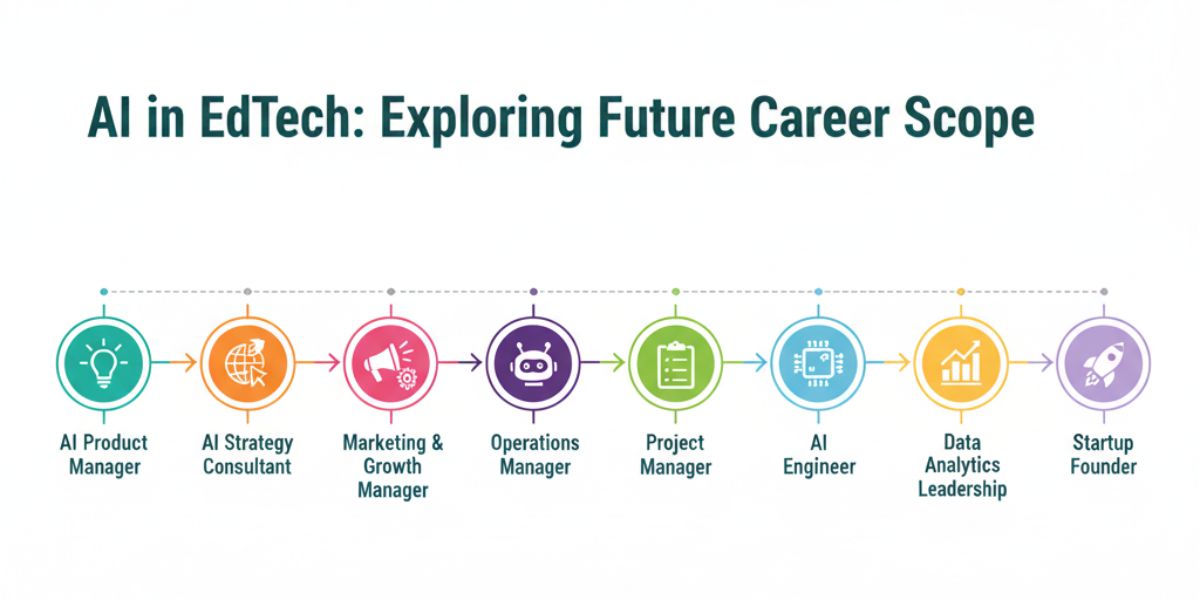
Table Of Contents
▲AI in EdTech: How Artificial Intelligence Is Reshaping Education in 2025?
Imagine a classroom where every lesson is tailored for you. Sounds futuristic, right?
Innovation in 2025 has tuned the power of Artificial Intelligence, where it can turn your vision into reality. AI is no longer just an emerging tool; it has started to lead the next wave of education technology.
AI in Edtech is becoming a fundamental part, where learning is being reshaped, making it a convenient space for students. The usage of ChatGPT has doubled in recent times, automation has taken place in corporate offices, and students are using the LMS( Learning Management System) to pace themselves with ongoing learning.
In this blog, we will carefully understand the evolution of AI in Edtech and how it's reshaping the educational industry in 2025. Let’s dive in to know how AI has changed the way we learn, teach, and experience education today.
What is AI in EdTech?
AI in edtech refers to the integration of artificial intelligence in the educational and learning sectors. This involves utilizing AI tools for the complete automation of administrative functions, tailoring instructional materials, and providing instant feedback to students.
With this process of huge student data, AI offers information for optimising students' learning experiences.
The market for AI in edtech was estimated at USD 5.88 billion in 2024 and is projected to reach USD 32.27 billion by 2030, with a growing CAGR of 31.2% from 2025 to 2030, according to the report of Grand View Research Now that you’ve learnt the market size, let’s understand how AI influences the educational sector:
Improved Student Engagement:
According to studies, 53% of educational institutions report that AI significantly enhances student engagement.
Administrative Efficiency:
An AI grading system will reduce teachers' workload by 70%, allowing them to devote more time to student interaction.
Personalised Learning:
In education and corporate offices, AI chatbots are 91% accurate in offering customised assistance to students, meeting unique learning requirements.
The Surge in AI Education
Education has come a long way, evolving from traditional learning methods to interactive digital platforms. We are living through one of the most powerful changes in the learning environment today, thanks to Artificial Intelligence (AI).
With AI, data is now at our fingertips, and learning has become more accessible and tailored. This shift in education moves from a one-size-fits-all model to a customised experience tailored to each student’s individual needs.
For instance, AI tools have proven to boost test scores by 62% using an adaptive learning approach, and many educational sectors like schools and universities embrace these AI technologies. The future of education is becoming more dynamic and efficient.
Difference Between Traditional and AI-Powered Learning
Traditional classrooms often adhere to traditional lesson plans, static teaching practices, and manual grading. It fails to suit specific learning styles and creates knowledge gaps among students.
Instructors handle large class sizes, precluding one-on-one attention. Grading and assessment consume excessive time while increasing the workload of both learners and educators.
On the other hand, AI classrooms leverage adaptive learning software that adapts content to each learner’s progress. Grading in edtech has been automated by 70%, freeing instructors from the workload to focus on addressing student engagement.
AI further supports interactive learning by utilising intelligent content, chatbots, and virtual mentors, providing uninterrupted learning support.
With 80% of teachers using AI-powered platforms weekly, education is becoming more accessible and efficient.
| Feature | Traditional Classroom | AI-Powered Classroom |
|---|---|---|
| Teaching Method | Standardised Learning | Adaptive Learning Systems |
| Grading | Manual Assessment | Automatic Grading (70% workload reduction) |
| Student Engagement | Limited Interaction | AI-Driven engagement tools |
| Accessibility | Fixed Schedules | 24/7 Learning Support via AI |
| Personalisation | One-size-fits-all | Customised Learning Plans |
| Teacher Workload | High | Reduced Through Automation |
Key Application of AI in Education
AI in Edtech is transforming by enhancing accessibility, personalising learning experiences, and automating administrative tasks.
Here are the key applications of AI in Edtech, which is defined in easy terms:
Task Automation
AI automation tasks such as homework assessments, test grading, and report generation. This enables educators to focus on more meaningful instructional activities and student interactions.
Smart Content Creation
AI in edtech prepares students to learn the creation of digital lessons and study materials. Tools like Eduaide.AI simplify lesson planning, create assessments, write individualised education plans (IEPs) and more to modernise learning and streamline instruction.
Learning Management Systems (LMS)
AI has enhanced the LMS platforms by offering personalised learning paths, automating administrative tasks and offering data-driven insights into student performance and engagement.
Plagiarism Detection
AI in edtech uses key tools like Plagiarism detectors for assessments submitted by students to check whether their work goes against a vast database of academic content, ensuring academic integrity and originality in student work.
Adaptive Learning
AI-driven platforms assess students' skill levels in real-time and tailor instructional content to meet the needs of each student. These systems adapt lessons dynamically based on student responses, offering them customised pathways to help students master concepts at their own pace.
Data and Learning Analytics
AI helps students to analyse data from online learning portals, classroom attendance and grades. This data offers insights into students' performance, assisting the educators in identifying trends and tailoring instruction to address gaps in understanding and performance.
Classroom Management
Platforms use AI to gamify classroom management. It tracks students' behaviour and engagement, rewarding positive actions with points, badges and providing teachers with insights into classroom dynamics to manage and motivate students.
Benefits of Integrating AI in EdTech
Artificial intelligence is no longer just a future trend, but a driving force behind smooth learning in today’s fast-paced education sector. By integrating AI into classrooms, educators can personalise learning experiences, streamline tasks and offer more effective learning support to students.
Here are some of the key benefits AI brings to the education platform.
Enhanced Personalised Learning
AI tailors educational content according to each student's learning preferences and pace. For instance, platforms like Smart Sparrow and DreamBox analyse student responses in real-time to adapt lessons dynamically, enabling students to master concepts at their own pace.
Automated Administrative Tasks
AI automates grading, scheduling and report generation, significantly reducing the educators' workload. Using tools like Gradescope offers consistent and objective grading of assignments, while AI scheduling software helps optimise class timetables and resource allocation.
More Engaged Learners
AI enhances students' learning by making it more interactive and engaging through gamified content and adaptive learning platforms. Amity University has recently introduced gamified interaction, where there will be game-like features used to co-create compelling experiences.
AI in edtech creates interactive quizzes and simulations that respond to student input, keeping learners engaged, motivated and involved.
More Efficient Classroom Management
AI tools help teachers manage classroom behaviour and engagement. For example, Classcraft uses AI to gamify classroom management, tracking student behaviour and rewarding positive actions, which helps maintain a productive and motivated classroom environment.
Workload Reduction
AI reduces repetitive tasks, allowing students to focus more on the strategic and creative aspects of management learning.
Enhanced Research & Writing
AI in edtech uses tools like ChatGPT, Grammarly, and QuillBot to assist in report writing, presentations, and project submissions.
Common AI Tools Used in the Education Sector

As time passes by, students have gained hands-on experience using standard AI tools that help them ease their learning process. Some key AI tools used while studying in 2025 are:
ChatGPT
ChatGPT is one of the standard AI tools used by students in the education sector, which assists students with explanations, content generation, essay writing, and personalised learning support, helping them complete assignments and other work.
Grammarly
It’s an AI-powered writing assistant that helps students improve their grammar, spelling, tone and gives clarity.
Duolingo
Uses AI for language learning with adaptive lessons and gamified practice.
Quillbot
Quillbot is an AI-powered writing and paraphrasing tool that helps students to rephrase, summarize, and improve content clarity to its depth. It enhances academic writing by offering grammar checks, citation support, and style suggestions.
Virtual tutors
Virtual tutors are AI-driven systems that leverage NLP and ML algorithms to engage students in interactive conversations, providing personalised learning experiences.
Virtual tutors can adapt according to students' pace, style and preferences, making the learning process more engaging and effective.
Automated Assessment Systems
Traditional assessment methods were time-consuming and lacked real-time feedback with AI-powered automated assessment systems. It aims to address these challenges using algorithms to evaluate students' performance in real-time.
It identifies knowledge gaps and provides targeted feedback to help students improve their understanding of a particular topic.
Chatbots
AI in edtech is getting famous more for AI-Chatbots, a computer program that is used in education to interact with students conversationally. It uses NLP to answer course content, assignment and deadline questions.
Chatbots ease the life of educators to attend to more complex questions and clarify doubts. Students benefit from the convenience of 24/7 availability and personalised response.
Google Classroom (AI Integration)
Student uses AI for innovative grading suggestions, assignment organisation and recommendations.
Future of AI in EdTech
AI is the future we heard about it back then, and living the reality in 2025. It has overtaken education through its personalised experiences and easily accessible opportunities. According to the Higher Education Policy Institute report, the use of AI has increased by up to 92% from the school to university level, marking the most significant growth.
In 2025, students and professionals in EdTech increasingly rely on AI tools like ChatGPT and Grammarly for text generation, while also creating numerous replicas to automate the majority of tasks.
The rise has been tremendous, and with more passing time, it will keep on evolving.
The Generative AI is disrupting and absorbing vast amounts of curriculum and pedagogical resources. Deep learning networks gather data from textbooks, quizzes and assessments for analysis.
The ML model identifies key elements such as subject matter depth, difficulty gradients, and assessment structures. The use of Generative AI is to craft a new contextually appropriate curriculum that can be personalised based on students' learning capabilities.
AI enables more precise and impartial assessments by utilising NLP and ML technologies. It assesses students’ answers in a manner that closely mimics human evaluation. The system analyses the content, coherence and language usage to offer an accurate score. Using the AI-powered methods reduces the time and effort required for grading. It also eliminates any biases.
Top Universities Successfully Implemented AI in Online MBA Education
Professionals, who are keen to update their AI skills, can go for Gen-AI MBA education provided by the top universities listed below:
Amity University
The next-generation online MBA program at Amity University is renowned for its high-quality education and for preparing you for careers in AI. As we understand, the evolution of AI is growing rapidly, and there’s a considerable demand going to be in future.
Amity University provides certification for the basics of AI, while also making you learn smarter with Interactive Learning Material With AI-powered features.
Manipal University Jaipur
The Manipal University, Jaipur offers several AI-enabled online MBA programs that reflect modern digital & AI trends.
Professional and recent graduates take classes via LMS and live-recorded lectures.
Chitkara University
This University offers a program in Data Science & AI, which is partnered with EY, offering business fundamentals with machine learning and AI applications.
This MBA program from Chitkara University covers key tools for learning, including ChatGPT, Copilot, Generative AI, and Ethical AI Practices. Not only that, but the program will also prepare you for strong career support, including interview preparation and alignment with AI-driven roles in analytics, product management, and strategy.
UPES
UPES Online MBA integrates AI into its curriculum through specialised programs, such as the MBA in Business Analytics, developed in collaboration with KPMG.
This program covers advanced topics, including Generative AI for Business and Deep Learning for Business Applications, preparing students for data-driven decision-making in various industries.
DY Patil Vidyapeeth University
The online MBA from DY Patil Vidyapeeth University is powered by Gen AI, redefining business education with Artificial Intelligence.
The curriculum is enriched with AI tools and 14+ specialisations to choose from, while the Industry-relevant specialisations include AI in Marketing, Finance, and Operations.
AI in EdTech: Exploring Future Career Scope

The career shift has been transforming, and many job roles have started being automated to reduce the time and effort. In 2025, many universities are expected to offer AI-based courses to prepare students for careers in the field of AI.
Some popular AI jobs in 2025, along with their respective salary structures, are listed below according to Glassdoor.
| Job Roles | Average Salary in INR |
|---|---|
| AI Product Manager | 33,00,000 |
| AI Strategy Consultant | 24,00,000 |
| Marketing & Growth Manager | 16,00,000 |
| Operations Manager | 10,00,000 |
| Project Manager | 16,00,000 |
| AI Engineer | 12,15,000 |
| Data Analytics Leadership | 18,00,000 |
| Startup Founder | 25,00,000 |
| Marketing Manager | 13,50,000 |
Please note: The salary mentioned above is subject to change over time.
Conclusion
As we move through 2025, the year when AI has shifted its power to the educational and corporate sectors. Automation is on the rise as students and professionals regularly use AI tools such as ChatGPT, Co-Pilot, Grammarly, and Google Gemini to ease their workload and complete assessments more efficiently. AI in edtech navigates these changes and focuses on real problems with measurable outcomes to remain the surest path to success.
AI in edtech continues to offer comprehensive assistance and prepare them for AI-driven careers.
FAQ
What is AI in education?
How is AI transforming education in 2025?
How is AI reshaping the future of education?
Enroll with Us

Recent Blogs
 Online MCA for Working Professionals in India 2025
Online MCA for Working Professionals in India 202530 September 2025


Confused about your career path?
Connect with an expert counsellor today!
LIFETIME FREE
Our Top Mentor

⭐ 4.7
Ravinder Kumar
4 years experience
Sr. Mentor MCA

⭐ 4.6
Anuj Chand
6 years experience
Sr. Mentor BBA

⭐ 4.6
Dhruv Pahwa
4 years experience
Sr. Mentor MCA

⭐ 4.8
Ruchi Parashar
5 years experience
Sr. Mentor BCA

Categories
- > Online MBA
- > Online MCA
- > Online M.Sc
- > Online BBA
- > Online BCA
- > Online BA
- > Online PGDM
- > Online Certifications
Trending Search
- > Online MBA Fees 2025
- > Online MBA Admission Process
- > Online MBA Syllabus
- > Online BBA Fees 2025
- > Online PGDM Fees 2025
- > Best Online PGDM Colleges in India
- > Best Online BCA Colleges
- > Online BCA Admission 2025
- > Online BA Admission Process
- > Best Online MA Programs
- > Best Online Universities in India
- > Online Degree Courses in India
- > Best Online Courses for Working Professionals
- > Career after Online MBA
- > Online BBA Program
Tags
- > AI in edtech
- > AI careers in 2025
- > AI growth in 2025
- > AI courses
- > AI learnings in 2025

At MBA Query, we are delighted to help students with their admission journey. We offer proper guidance on choosing management programs, selecting ideal specialisations, and crafting a smooth, step-by-step application.
Top Universities
Best Online Courses
Opening Hours
10:00 AM - 7:00 PM
Monday - Saturday
Info@mbaquery.com
Cities
Mumbai | Hyderabad | Gurugram | Jaipur
Resources
Reviews | Admission Guides | Career Counseling | Scholarship Assistance



